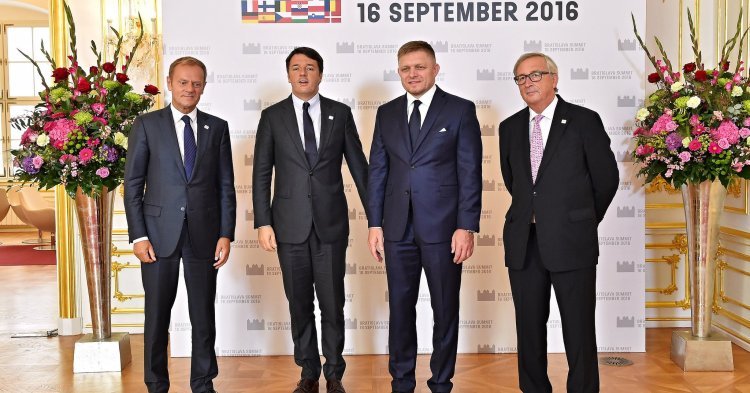Who really rules Europe?
Over time, in federations there is typically a centralisation of powers, and in this regard the EU fits the bill. “If you look at the history of the EU, there has been a logic there. First there is a challenge or a crisis. Then, the problem is that to reach a decision at the EU level you would need the agreement of all member states. Then, if the crisis is serious enough, the member states find a consensus and transfer policy-making powers to the European level, after which normally the decision-making will be made by some kind of a majority in the [...] Council”, Raunio says.
In the recent years we’ve seen the national leaders of Europe discuss key decisions with each other time after time. However, the distinctly European institutions haven’t been made weaker in the recent years, to the contrary. “I don’t actually buy the argument that there’s a shift towards more intergovernmentalism in Europe. It just reflects what’s on the agenda of the EU. We’ve had Eurocrisis, asylum seekers, Brexit and Russia, and these are issues where decision-making power still lies in the hands of national governments. It’s been natural that the Commission hasn’t been as visible as usual. At the same time, the beneficiary of the changes that have come about with Eurocrisis has nonetheless mainly been the Commission or indeed the European Central Bank, in that they have been given more powers.” Raunio says that in the coming years, it will be interesting to see whether the European Council or the Commission emerges as the stronger institution.
Henry Kissinger famously asked, “Who do I call if I want to speak to Europe?”. Raunio raises similar concerns. “A big question the EU needs to seriously face at some point is how to make sure that the leadership of the EU is more streamlined. When you look at the various proposals for reforming the Eurozone, there are plans for a high representative for the Eurozone. It seems that there are more and more posts being planned and filled. My guess is that over time some of these will merge. There are so many competing power centres in the EU that it’s confusing even for us political scientists to try to follow what’s going on in Brussels.”
Ideological battles, not just national power games
The Spitzenkandidaten system may bring the Commission closer to the status of a European government, though for Raunio a key point is that the system required no changes to existing EU law. “What I liked about Spitzenkandidaten is that the political side of the Commission was highlighted. My problem with the standard media coverage of the EU is that it’s often seen as a kind of a power game between countries instead of focusing on the more ideological battles going on in the EU institutions between politicians representing different parties”, Raunio says. “Why does the media never mention the simple fact that the Commissions appointed since 2004 have all had centre-right majorities, like the current one? That of course is seen in what kind of policies they put forward.”
This can explain the disapproval many among the far-left have towards the EU. But a slogan of theirs, “Another Europe is possible”, shows that they object to the current form of the EU, rather than the idea of a European union as such. Raunio agrees that nearly all parties accept some form of Europe, which makes the speculated breakup of the EU unlikely. “I would say, in terms of seats in national parliaments, around 95 percent are in favour of some kind of European integration. Even the British Conservatives are, even though they’re leaving.”
Federalists are neither right nor wrong
The EU needs clear leadership, and it’s not just a power game between the member states, but ideology is a crucial factor. With Spitzenkandidaten, are we not closer to a democratically legitimate nexus of power in the Commission? Not so fast. “The problem here is that there’s no simple answer to democratic legitimacy or how to improve it. One can just as well argue that the way to strengthen legitimacy in the EU is through empowering national governments and the European Council, especially given the lack of a so-called European identity”, Raunio points out.
“This is exactly where the consensus ends”, Raunio says. “You have the Eurosceptic parties calling for more powers to the national governments and the intergovernmental institutions, and then you have the more federalist line of argument which emphasises the parliamentary model adopted at the European level. Both are in a way right, there is no objective answer.” This echoes what Raunio wrote in his 2002 Liittovaltiot (‘Federations’) book: federations are scientifically neither superior nor inferior as systems of governance, but ultimately it’s a matter of preference.
Whichever way we move, the strict requirement of unanimity is unsustainable. “Achieving the required consensus among the 27 is simply so difficult that if the EU wants to achieve efficient decision-making, the rule needs to be relaxed. I do believe that even if the European Council remains as the strongest institution, there will be more issues where decisions are taken by qualified majority. It has to go down that road.”
In politics, there will always be winners and losers in the short term. If the federalist, parliamentary model is adopted, the losers will be those who failed to gain enough support on election day. Decision-making by unanimity may seemingly be the closest we can get to an “everybody always wins” situation, but the practically built-in inefficiency of the system in fact turns us all into losers. Whichever model is adopted, in a perfect world we will hopefully know exactly who’s in charge of the EU.
This was the second part of a series of three articles based on the interview. You can find the first part here. In the next part, we’ll discuss parties, national parliaments and citizens’ access to information about the EU. The final part will be published on June 12.
Resources
Raunio, T. (2002) Liittovaltiot: Federalismin teoria ja arki. Helsinki: Gaudeamus.




Follow the comments: |
|
